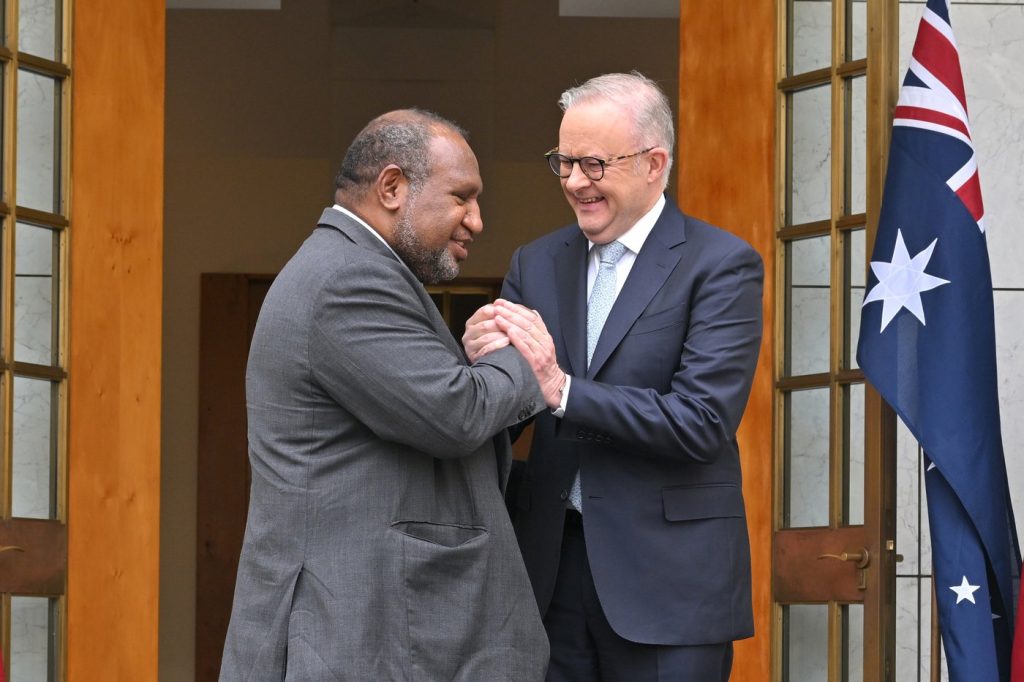MELBOURNE, Australia (AP) — On October 6, 2025, the leaders of Australia and Papua New Guinea, Prime Minister Anthony Albanese and Prime Minister James Marape, signed a significant bilateral defense treaty in Canberra. This agreement, which China perceives as unfairly targeting its interests, marks a milestone in the defense relationship between the two nations, fostering unprecedented integration of their respective defense forces and military personnel.
The treaty holds special significance as it is Australia’s only alliance-level security pact aside from the ANZUS Treaty formed with the United States and New Zealand in 1951. For Papua New Guinea, it represents the first formal defense treaty in its history as Australia’s closest neighbor and former colony. The treaty will come into effect after being ratified by the parliaments of both countries, reflecting a commitment to mutual defense obligations akin to those outlined in the ANZUS Treaty.
During a joint press conference, Albanese expressed his pride in having Papua New Guinea as Australia's newest ally, stating, “This treaty contains a mutual defense obligation similar to Australia’s ANZUS Treaty commitments, where we declare that in the event of an armed attack on either of our countries, we would both act to meet the common danger.” He also emphasized that both nations agreed not to engage in activities or agreements that could undermine the treaty's implementation.
Following the signing of a joint statement on the treaty's core principles last month, the Chinese Embassy in Papua New Guinea issued a statement expressing concerns, indicating that such a bilateral pact "should not be exclusive in nature, nor should it restrict or prevent a sovereign country from cooperating with a third party for any reason.” The embassy's statement also included a reminder for the treaty not to target any third parties or infringe upon their legitimate rights and interests.
Addressing these concerns, Marape reiterated that the treaty does not compromise Papua New Guinea’s overarching foreign policy of being “friends to all, enemy to none.” He described the agreement as a mechanism that consolidates friendships rather than pitting nations against each other, stating, "We’ve been transparent... we have told them that Australia has become our security partner of choice and they understand.”
The treaty reinforces the security partnership between Australia and Papua New Guinea, aiming to balance Papua New Guinea's interests as it seeks closer economic relationships with China. Both the United States and Australia have enhanced military ties with Papua New Guinea in recent years, viewing it as a strategically important ally in countering China’s expanding influence in the Pacific region.
Australia has actively focused on strengthening relations with island nations since 2022, particularly after China entered into a controversial security deal with the Solomon Islands, which raised alarms about the potential establishment of a Chinese naval base in the South Pacific. Outside of Australia and New Zealand, only Papua New Guinea, Fiji, and Tonga possess military forces in the South Pacific, with Australia currently negotiating a defense pact with Fiji as well.
Furthermore, since 2019, three Pacific island nations have switched their diplomatic recognition from Taiwan to Beijing, showcasing China's burgeoning influence in the region. The U.S. and its allies express heightened concern regarding China’s security reach, particularly through police training initiatives in several island countries including Fiji, Kiribati, Samoa, Solomon Islands, and Vanuatu.











